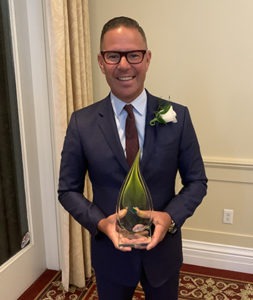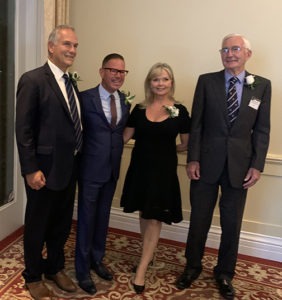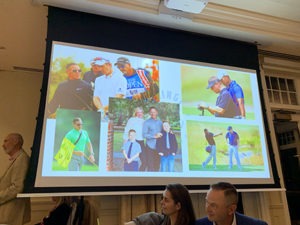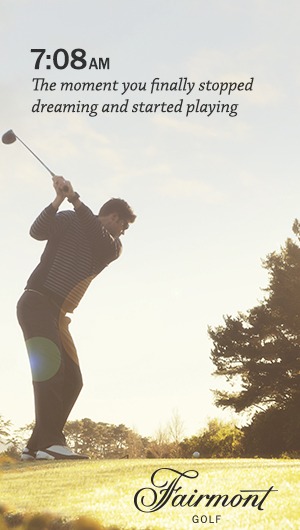He was now 47, and I hadn’t seen him face to face in years, but Sean Foley still looked in his late 30s—smiling, fit, predictably tanned and exuding enough energy to power the GTA through January.

Professional golf swing coach Sean Foley with his Burlington Sports Hall of Fame trophy on Oct. 26.
Foley had flown in for his induction to the Burlington Sports Hall of Fame. He could easily have Zoomed his acceptance speech from his residence in Keene’s Pointe, a gated community in Windermere, Florida, but his hometown of Burlington holds a special place in his heart, and this was simply the right thing to do.
When he burst through the door of his parents’ place at 9 p.m. the night before, it was pure Canadiana. He had a bag of Swiss Chalet in hand and a bump on his noggin, the latter of which was incurred after he and a fellow Air Canada passenger knocked heads while simultaneously attempting to help a female passenger with her overhead baggage.
“I was like, ‘Of course this is a Canadian flight!’” Foley related to the Covid-limited capacity crowd at the Hall of Fame Ceremony at Burlington Golf & Country Club on October 26th.
Foley was one of five inductees on the evening, along with Dr. John Kendall, an accomplished distance runner and recipient of the Queen’s Commemorative Jubilee Medal and Physicians Care Award; Jim Lawson, a former CFL Commissioner, Montreal Canadiens draftee and recognized as one of the Top 25 most influential sport persons in Canada; the late Hamilton Spectator journalist Don Lovegrove; and renowned gymnastics instructor Carol-Angela Orchard, whose accolades include the Honourary Diploma of International Coaching, the highest recognition bestowed by the International Gymnastics Federation.
AN EMOTIONAL DAY
At the podium, Foley was his usual effervescent self. He tends to be an open book when it comes to his opinions—admittedly more Stephen Hawking’s A Brief History of Time than Dr. Seuss’s Cat in the Cat, but open and honest nonetheless.

Joining Foley at this year’s induction ceremony were (left to right) Jim Lawson, Carol-Angela Orchard and Dr. John Kendall.
“I don’t like to think about things before they happen because I like to embrace the emotions of the moment,” he began. ”I’ve been around the world, I’ve had a lot of successful days, I’ve had incredible lows. But to be here tonight, with my mom and dad, who I haven’t seen since the start of the pandemic…”
And that’s when the tears started flowing.
“This is really special,” Foley continued. “I never did my job wanting to be applauded for anything. Being honoured is really weird. I looked up at (the Tour player images on) that screen tonight and thought, ‘I screwed up with him. I could have done that with him… I can actually tell you what I was thinking in all those images—‘What am I doing here?’”
But Foley can’t be that shocked at where he currently finds himself on his career path. It has very much been a self-fulfilling prophecy, even as others scoffed at his confidence in becoming a top PGA Tour swing instructor as he toiled on the range as an assistant pro at Glen Abbey GC in Oakville 20 years ago. While fellow junior prospects headed back on the course after training with the legendary teaching pro Ben Kern at The National GC in Woodbridge, Ontario, a 13-year-old Foley hung out to watch Kern work with Canadian Tour players. And while others his age yearned to be inside the Tour shoes of those competing at the Canadian Open, a 15-year-old Foley camped out on the Glen Abbey driving range to watch David Leadbetter refine Nick Faldo’s action.
There are stories of Foley breaking down his competitors’ swings in the middle of a tournament. But the pièce de résistance occurred while on his golf scholarship at Tennessee State University.
“Boyd Mickle and Steve Diamond, who I knew and who were members at Hamilton G&CC, were playing for Austin Peay State University, and the day before the conference championship I worked with them on the range,” Foley recalls. “And then they went out the next day and shot 64 and 65 and basically lapped us. So that wasn’t cool for my coach. I got kicked off the team after that tournament.”
THE PURSUIT OF HAPPINESS
Today the swings under his learned eye belong to Cameron Champ, Byeong Hun An, England’s Danny Willett, Mel Reid and Sam Horsfield and Dutch golfer Anne van Dam. And while that pro stable has recently included former World No. 1 Justin Rose and the most famous of them all, Tiger Woods, it’s Lydia Ko that Foley might hold in highest esteem.
Beyond her outlook on life, Ko “is the best player I’ve ever seen, and as many wins as Tiger at her age,” Foley says of the 24-year-old Korean-born New Zealander. “And now that she has come back and is playing great, she’s getting beat by the people she inspired! She’s probably not as free and clear as when she was a kid, but we’re sneaking up on it.”
Sneaking up fast. Ko won again last weekend, capturing the Saudi Ladies Invitational by five strokes. But when she won the Lotte Championship in Hawaii in April, it was her first victory in three years. Foley opened up on Instagram right after that, noting that working with Ko reminded him why he fell in love with coaching.
 “I think when I first started on Tour, I worked with whoever I could pay the bills with,” Foley shared after the Hall of Fame ceremony in Burlington. “Now, after 16 years, I want to work with players that I want to spend the day with, because I’m away from my wife Kate and my sons Quinn and Kieran. And that only gets harder, not easier. So it’s got to be worth it—not so much on a professional level as a personal level.”
“I think when I first started on Tour, I worked with whoever I could pay the bills with,” Foley shared after the Hall of Fame ceremony in Burlington. “Now, after 16 years, I want to work with players that I want to spend the day with, because I’m away from my wife Kate and my sons Quinn and Kieran. And that only gets harder, not easier. So it’s got to be worth it—not so much on a professional level as a personal level.”
MIND GAMES
Through it all, Foley has always been a little different when it comes to coaxing the best out of his players; his swing teachings intertwined with biomechanics, physiology, nutrition and performance psychology. For example, beyond the Xs and Ys, there are even the Zzzzz to consider. A few days before Ko’s win in April, Foley was posting on Instagram regarding proper breathing, the parasympathetic nervous system and the importance of sleep.
Foley knows from personal experience, having tossed and turned while building his own imposing résumé under a spotlight.
“Success is a smokescreen for wounded people,” he cautions. “You look like you’re doing well, but to get to that point you’ve been through a lot of shit days. I think we’re just constantly healing from the traumas of yesterday.”
If you’re looking for trite commentary, Foley is probably not your cup of tea. For he has always been as comfortable chatting about Aristotle and Darwin as Hogan and Trevino. But it’s that depth and flexibility that have served him well in the politically charged atmosphere of the U.S. Last year Foley shared a story in Instagram about arriving in Memphis for a Tour stop and encountering two men in a heated exchange at the airport—one wearing a mask and the other not. “I’ve seen this before and I knew this was going to go off and I came between them and yelled, ‘Stop!’” Foley shares. “And I said, ‘Can I ask you something?’ And they didn’t really reply. ‘Do you love your mothers?’ I asked. And they said ya. And I asked, ‘Do you like having beers with your friends?’ And they said ya. And I asked, ‘Are you doing a perfect job as a parent?’ And they both said no. And I said, ‘Do you wish you were better at what you did for a living?’ And they said ya. And I said, ‘So why are we so busy focusing on what is different about ourselves rather than what is the same?’
“When it comes down to liking someone or not liking someone, it’s all based on what you choose to focus on.”
THE WINDING ROAD
As inevitable as his success would seem to have been, Foley’s evolutionary curve is not so much a steady arc as a double-helix of twists and turns. But it’s easy to pinpoint the critical juncture along the journey. It’s when Kate—“Sweet Kate”—provided the supportive shove in 2006, when Foley made the move to Florida to open a junior academy, to make that pilgrimage to the Mecca of golf instruction.
“I took about a thousand percent pay cut,” he admits. “But I had this incredible woman from Oakville who was probably on her way to becoming a CEO or Prime Minister, who said, ‘I believe in you. I know you can do this.’
“And I come back here 15 years later, honoured for this award. It’s crazy.”
Crazy is the number of lives the driving range rat from Burlington has touched beyond the golf course, from attendees of corporate mental health seminars to professional athletes who have reached out from other sports over the past year.
Foley may often sound deeper than a desert well, but there’s a simplicity in his approach to setting the mind free.
“I think life is inside-out,” he says. “A lot of us think it’s outside-in. But once you realize that the source of our discomfort comes from ourselves, then we’re off to the races.”

2 Comments
Leave your reply.